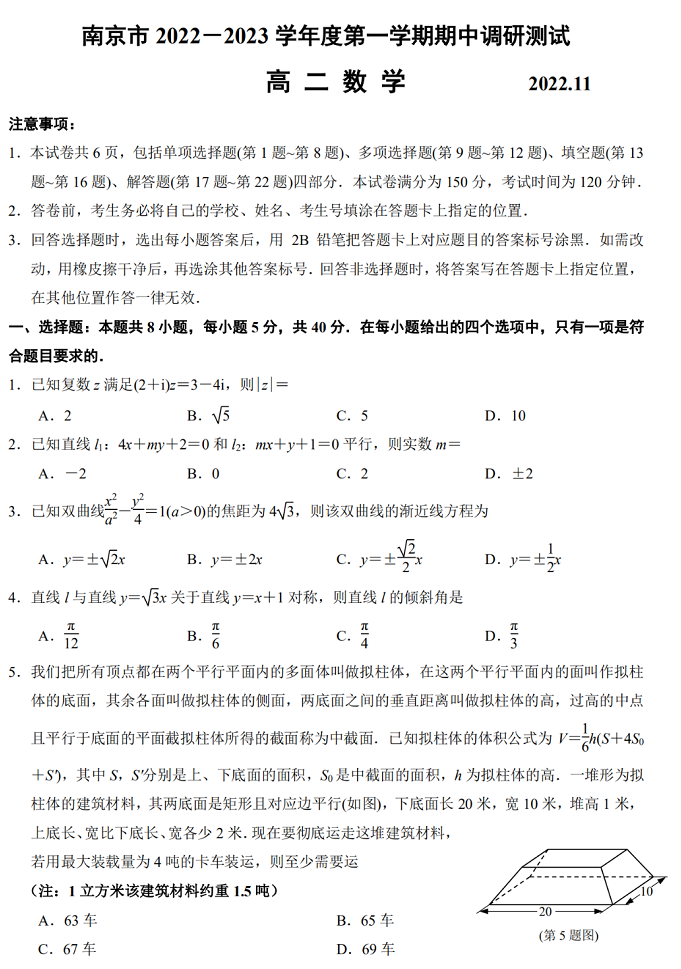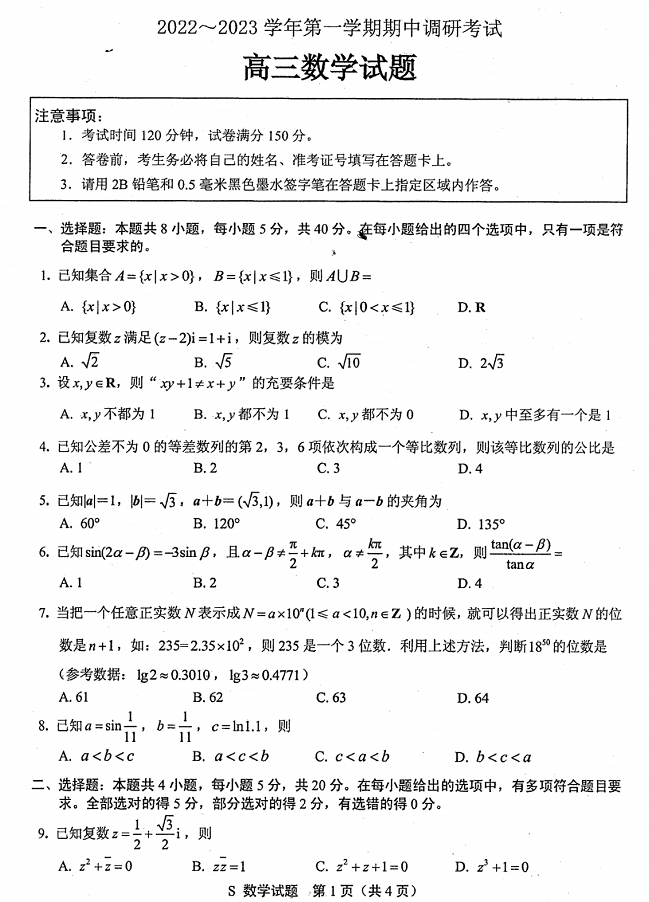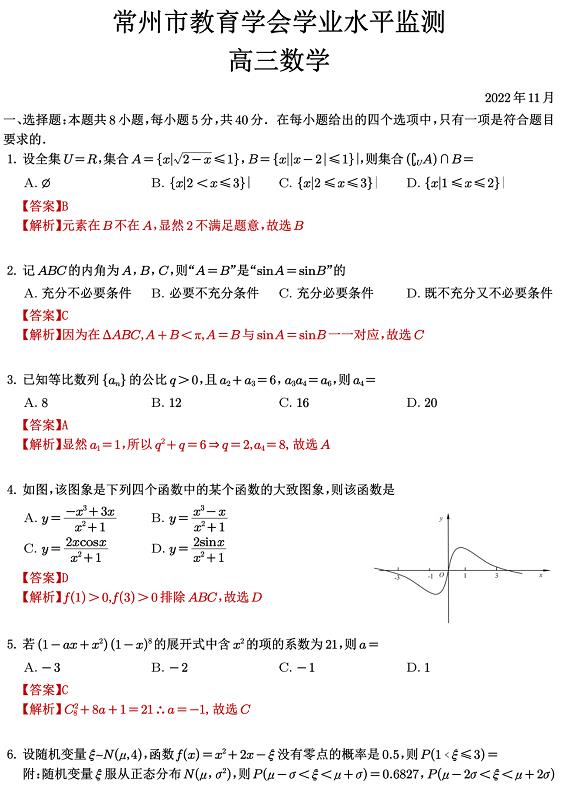2018南宁一模广西南宁市2018届高三第一次模拟考试英语试题及答案
广西南宁市2018届高三第一次模拟考试英语考试已经结束了,不知道这门英语考试同学们都考的怎么样?伊顿教育小编这里有本次2018南宁一模考试的的试卷及答案,首先小编会将广西南宁市2018届高三第一次模拟考试英语试题整理分享出来,其次会整理出广西南宁市2018届高三第一次模拟考试英语试题答案。

2018南宁一模广西南宁市2018届高三第一次模拟考试英语试题及答案
分享:2018南宁一模广西南宁市2018届高三第一次模拟考试英语试题答案
第一部分 听力(共两节,30分)
第一节(共5小题;每小题1.5分,7.5分)
听下面5段对话。每段对话后有一个小题,从题中所给的A、B、C三个选项中选出较佳选项,并标在试卷的相应位置。听完每段对话后,你都有10秒钟的时间来回答有关小题和阅读下一小题。每段对话仅读一遍。
例:How much is the shirt?
A. £ 19.15. B. £ 9.18. C. £ 9.15.
答案是C。
1. What is the woman’s job now?
A. A lawyer. B. A bank clerk. C. A police officer.
2. Who did the woman meet just now?
A. A repairman. B. A postman. C. Her daughter.
3. When can the man see Dr. Johnson?
A. On Wednesday. B. On Thursday. C. On Friday.
4. What does the man mean?
A. He’d prefer to go by bus.
B. He wants to be comfortable.
C. Taking a bus is more convenient.
5. Why was the man late?
A. He got lost.
B. He had to take a rest on the way.
C. The bus he took stopped working.
第二节(共15小题;每小题1.5分,22.5分)
听下面5段对话或独白。每段对话或独白后有几个小题,从题中所给的A、B、C三个选项中选出较佳选项,并标在试卷的相应位置。听每段对话或独白前,你将有时间阅读各个小题,每小题5秒钟;听完后,各小题将给出5秒钟的作答时间。每段对话或独白读两遍。
听第6段材料,回答第6、7题。
6. What type of seat does the man want?
A. An aisle seat. B. A window seat. C. A seat by the emergency exit.
7. When will the man check the departure screens?
A. At 3:30. B. At 3:00. C. At 2:30.
听第7段材料,回答第8、9题。
8. What will they buy for the man?
A. Some shoes. B. A suit. C. A gift.
9. Who is getting married?
A. The speakers. B. The man’s classmate. C. The woman’s cousin.
听第8段材料,回答第10至12题。
10. What is the relationship between the two speakers?
A. Father and daughter.
B. Teacher and student.
C. Employer and employee.
11. What does Mary want to do first?
A. Get a respectable job.
B. Finish her homework.
C. Adjust the musical instruments.
12. What will Mary do next month?
A. Buy a house.
B. Attend important exams.
C. Join the “Dream Discs” band.
听第9段材料,回答第13至16题。
13. Where are the speakers?
A. In a hotel. B. At a restaurant. C. In a travel agency.
14. What was wrong with the bill?
A. The figure of 5.50 in it appeared three times.
B. A certain dish in it was mistaken for another.
C. The man was charged twice for the same thing in it.
15. Who made the mistake?
A. The cashier. B. The waitress. C. The customer.
16. How does the man pay the bill?
A. With a credit card.
B. With traveler’s cheques.
C. With cash in the local currency.
听第10段材料,回答第17至20题。
17. What caused the road accident?
A. The speeding truck. B. The speeding bus. C. The overloaded truck.
18. Why did the workers go on strike?
A. They were fired.
B. They were badly paid.
C. Their factory was moved out.
19. Which of the following has been announced?
A. The new house policy.
B. The result of the strike.
C. The unemployment figures.
20. What is going to be reported next?
A. The housing information.
B. The weather forecast.
C. The traffic condition.
#p#副标题#e#
第二部分 阅读理解(共两节,40分)
第一节(共15小题;每小题2分,30分)
阅读下列短文,从每题所给的四个选项(A、B、C和D)中,选出较佳选项。
A
VISIONS Service Trip
Summer Volunteer Program for Teens
Be a Teen Without Borders this summer! Our high-quality volunteer travel programs are intended for teens or middle school students who want to finish difficult projects and make long-term friendships. Through service work and cross-cultural living, VISIONS offers new ideas and deep learning while helping poor communities. Our evenings and weekends are kept for traveling around. English, Spanish and French language programs are in the US, Caribbean, Central America, South America and Asia.
Dates: 2-4 week programs in July and August.
DESTINATION LANGUAGE DATES DURATION SERVICE HOURS TUITION
Dominican Republic Spanish 06/30-07/20 21 days 70 $ 4950
Ecuador & Galapagos Spanish 06/30-07/24 25 days 80 $ 6150
Peru Spanish 06/30-07/24 25 days 80 $ 5650
Guadeloupe French 07/01-07/25 25 days 80 $ 5950
Alaska English 06/30-07/27 28 days 100 $ 5950
British Virgin Islands English 06/30-07/09 10 days 40 $ 3250
Cambodia English 07/20-08/09 21 days 70 $ 4950
Contact: VISIONS Service journeys, 541 E. Babcock St., Bozeman, MT 59715.
Tel.: 406. 551. 4423
Email: info@ VisionsServiceAdventures.com
Website: VisionsServiceAdventures.com
21. What does VISIONS start the activity to do?
A. To visit Caribbean.
B. To give teens a chance to travel.
C. To provide volunteering service.
D. To learn Spanish in South America.
22. How long will volunteers provide service in British Virgin Islands?
A. 40 hours. B. 70 hours. C. 80 hours. D. 100 hours.
23. Where are volunteers needed to teach French?
A. Peru. B. Alaska. C. Cambodia. D. Guadeloupe.
#p#副标题#e#
B
She sat at the picnic table alone. Recess (休息) was in full swing. She remained awkward around her classmates. She seemed unsure of what to do or say, yet I could see her eyes longing for acceptance. Many students had already decided that her friendship would not be worth the energy required to overcome the awkwardness. Others teased her. Most ignored her - except for one.
Brianna, the class clown, was making the other students laugh, as usual. “Brianna, do you see Molly down there? Would you mind walking down there and inviting her to come up here with the rest of us?”
Brianna sighed. I could tell she didn’t want to sacrifice precious minutes of her own recess to do what I was asking of her, but I also knew her heart. She often thought of others before herself — a rare character for anyone, much less a kid.
Knowing this choice was hard for her, I pulled out a D-buck, our class currency. Though bribery (行贿) was not the ideal way to handle this situation, I needed her cooperation.
“Here, I’ll pay you for your time.”
She offered an insincere smile, grasped the green paper, and headed down the hill.
As the rest of the children screamed and laughed, my eyes locked on Brianna as she neared the picnic table. Molly could be difficult, and I wouldn’t have been surprised if she sent Brianna back alone, refusing her invitation. When she encouraged herself to a standing position, I sighed with relief.
A minute later, I felt a tap on my shoulder. “Here, Mrs. D.” She handed me the D-buck.
“Why?” I asked.
“I shouldn’t keep this.” Her eyes fell to her feet, guilt radiating from her quiet voice. “I don’t want Molly to think I only went to get her so I could earn a D-buck. She’s my friend.” A moment later, they were all laughing again, and who should I see among them, laughing for the first time that week? Molly.
24. According to the author, Molly .
A. ignored the jokes from other kids B. felt awkward at being teased
C. desired to be accepted by other kids D. had no energy to make friends
25. What distinguished Brianna from other kids?
A. Her clown talent. B. Her cooperation.
C. Her honesty. D. Her kindness.
26. How did the author feel as Brianna walked to Molly?
A. Worried. B. Satisfied. C. Exicted. D. Confused.
27. Why did Brianna return the D-buck to the author?
A. She was afraid of losing it one day.
B. She expected a pure friendship with Molly.
C. She felt nervous at being bribed by a teacher.
D. She found it worth nothing outside the school.
#p#副标题#e#
C
We already know that plants are capable of learning and adapting to their environment, just like any organism. But a new study seems to suggest that plants can do more than just adapt. They can actually make decisions at that.
Perhaps we shouldn’t be surprised. Plants might be rooted, but their environments can be complex. In fact, researchers discovered that competition and a dynamic environment are what really pushes plants decision-making to its limits.
For instance, when competing with competitors for limited sunlight, a plant is faced with having to choose among a number of options. It can attempt to outgrow its neighbors, thus gaining more access to light. It can also attempt to go into a low-light survival mode, if it doesn’t consider an arms race to be worthwhile. The plant might also need to determine which way it should grow to best maximize its resources.
“In our study we wanted to learn if plants can choose between these responses and match them to the relative size and density(密度) of their opponents,” said Michal Gruntman.
In the experiment, whenever plants were presented with tall competitors, they would go into shade-tolerance mode. On the contrary, when plants were surrounded by small, dense vegetation, they would attempt to grow upright. But there were also wise decisions built into each of these situations, too. For instance, plants in shade-tolerance mode would make their leaves thinner and wider to capture as much light as possible relative to the level of their competition.
“Such an ability to choose between different responses according to their outcome could be particularly important in diverse environments, where plants can grow by chance under neighbors with different size, age or density, and should therefore be able to choose their appropriate strategy,” said Gruntman.
All of this basically means that scientists are beginning to look more closely at how plants work through their decisions. Obviously plants don’t have nervous systems, so more research will be needed to see exactly how these decision-making mechanisms (机能) operate within our plant friends.
24. Why do plants need to make decisions?
A. They are far different from other organisms.
B. They know how to adapt to their environment.
C. The environment where they are suited can change.
D. They have the ability of learning about environment.
25. The underlined phrase “an arms race” in Paragraph 3 means .
A. the attempt to grow B. the choice to survive
C. the way to maximize the resources D. the competition for more sunlight
26. What influences the size and shape of plant leaves?
A. How fierce their competitions are.
B. Where the plants grow actually.
C. Whether vegetation is dense or not.
D. What small plants they are surrounded with.
27. What is the best title for the text?
A. Plants can easily adapt to the environment.
B. Plants are capable of decision-making.
C. Plants can work like other organisms actually.
D. Plants compete for sunlight with each other.
#p#副标题#e#
D
The human brain remembers negative experiences more easily than positive ones. Our brains have developed this way because threats, like dangerous animals, had a more immediate effect on our ancestors’ survival compared to positive things like food or shelter. As a result, you will most likely know what makes you unhappy, but do you know what makes you happy?
Research suggests that our level of happiness depends partly on factors we cannot control—our genes and our life circumstances. But our level of happiness is also shaped by the choices we make. If you’ve been chasing wealth, fame, good looks, material things and power, you may be looking for happiness in all the wrong places. Psychologists suggest that the following habits make people happier.
People who form close relationships tend to be happier than those who do not. The number of friends we have is not important. What matters is the quality of our relationships. Relationships that bring happiness usually involve the sharing of feelings, mutual respect, acceptance, trust and fun.
People who exercise regularly improve both their physical and mental well-being. Some research has shown that exercise can be as effective as medical treatment for depression (抑郁症).
When we are so interested in an activity we enjoy that we lose track of time, we are in a state of flow. The activity could be making art, playing piano, surfing, or playing a game. People who experience flow in their work or hobbies tend to be happier.
People are more likely to be happy if they know what their strengths are and use them regularly. People who set goals and use their strengths to achieve them tend to be happier. People are especially happy when they can use their strengths to serve the greater good.
People who think positively by being grateful, mindful and optimistic are more likely to be happy. Being grateful means being thankful. Being mindful means being open to, focusing on and enjoying the experiences of the present moment. Being optimistic means being hopeful about the future.
28. What makes the human brain remember negative things more easily?
A. Negative things are easy to remember.
B. Dangerous wild animals are a threat to us.
C. Our ancestors had no enough food for living.
D. Negative things tend to affect human survival immediately.
29. What is the author’s attitude towards people looking for happiness in material things?
A. Uncertain. B. Opposed. C. Supportive. D. Optimistic.
30. In the last paragraph, the author suggests us .
A. enjoying our life and work
B. leading a happy life each day
C. being positive in our life and work
D. thinking more about the future
31. What does this text mainly tell us?
A. The factors that make people happy.
B. How to remember positive things easily.
C. The habits which people form in their life.
D. Why people remember negative things easily.
#p#副标题#e#
第二节(共5小题;每小题2分,10分)
根据短文内容,从短文后的选项中选出能填入空白处的较佳选项。选项中有两项为多余选项。
Here are some easy steps to create better habits that will surely improve your mental health.
• Get enough sleep. Keeping a consistent sleep schedule will ensure that your body and mind will function properly. Experts recommend that each person should sleep for at least 6.5 to 8 hours a night. 36 When you restart, it refreshes everything and helps your machine function faster and better.
• Do some exercise. You should know that regular exercise is necessary for a healthy body and soul. Some workout motivation tips from experts are that you should determine what exercises interest you and work your way up from there. Still no idea how to start? 37
• Mind what you eat. 38 You know your body and you also know potato chips have done nothing except make you feel sluggish and guilty. Do your heart and waistline a favor by feeding your body healthy things like lean protein, whole grains and fiber.
• 39 Use journaling as a way to release (释放) tension you may be holding in. You can also use it as a way to organize your thoughts, transfer the chaos from head to paper. You don’t necessarily have to write for an audience. In fact, writing for yourself can be regarded as self-treatment and help you become more aware of yourself and your own thoughts.
• Explore the world. You don’t need your passport for this one. 40 No matter how old you are, there are many things in this life that you have yet to experience. Get out of your comfort zone and see what the world has to offer you. You may actually be pleasantly surprised to try things you have never done before and find how enjoyable they are.
A. Start writing.
B. Balance yourself.
C. Put down the hamburger and accept whole grains!
D. Hire a personal trainer to help you get off your sofa.
E. Think of your body as a computer that needs some rebooting (重启).
F. Go out to new restaurants or hiking trails to expand your experiences.
G. Even if you have to work out slow at first, it’s better to start than not at all.
#p#副标题#e#
第三部分 英语知识运用(共两节,45分)
第一节 完形填空(共20小题;每小题1.5分,30分)
阅读下面短文,从短文后各题所给的四个选项(A、B、C和D)中,选出可以填入空白处的较佳选项。
Recently I dislocated (脱臼) my knee. I had never thought I would be on the cafeteria floor screaming for my life. I had never had so much 41 in my life. We went to the hospital and I got 42 news. I am a cheerleader and a basketball player. The 43 said to me, “Ms. Anita, your knee looks good but I 44 want you to know your knee will dislocate whenever it wants. You can be in the middle of a 45 game and your knee can just come out like it did today.”
My heart 46 . The first thing I thought about was not being able to do things the way I used to. So, I called my sister 47 and the first thing I told her was, “Sister, I am going to 48 everything”.
What she told me made me reconsider my 49 . She asked me, “Are you 50 going to give up what you 51 to do? Do you think that is going to 52 your knee? Do you think high school is going to be 53 for you? You can’t let this 54 your high school activities. You have to 55 and try even harder. Push for the things you want. You are going to have to work 56 for the things you love, so you’re going to play sports and Never Give Up”. These words coming from my sister 57 a lot.
It really isn’t fun being out of 58 , but I will be back soon. You should 59 give up things you like to do, even if you have a really bad 60 . You should never let that stop you from doing the things you love.
41. A. time B. stress C. pain D. confusion
42. A. terrible B. faithful C. pleasant D. comforting
43. A. nurse B. doctor C. coach D. patient
44. A. even B. ever C. thus D. just
45. A. basketball B. computer C. bicycle D. football
46. A. beat B. sank C. turned D. stopped
47. A. laughing B. joking C. crying D. waving
48. A. hug B. taste C. disturb D. quit
49. A. decision B. goal C. career D. process
50. A. hardly B. really C. exactly D. carefully
51. A. agree B. promise C. love D. refuse
52. A. cure B. lift C. cover D. help
53. A. simple B. similar C. mysterious D. fun
54. A. harm B. approve C. end D. raise
55. A. push B. decline C. ignore D. enter
56. A. farther B. harder C. 1ess D. better
57. A. meant B. suffered C. responded D. faded
58 A classes B sports C friends D arts
59 A always B bravely C never D slowly
60 A temper B habit C opinion D injury
第二节(共10小题;每小题1.5分,15分)
阅读下列材料,在空白处填入1个适当的单词或括号内单词的正确形式。
The copper drum is one of the most representative cultural relics and has condensed (浓缩) the 61 (wise) of the Zhuang people. There are now more than 2,400 copper drums in the world, at least 1,400 of them in Hechi, 62 (make) it a Copper Drum Cultural and Ecological Reserve with recognition across Guangxi.
Hechi’s copper drum culture dates back 63 the Han Dynasty (206 BC—AD 220), 64 the people living in the area considered copper drums holy. Now Hechi is still one of China’s 65 (large) copper drum sites. A 2003 survey by cultural heritage departments found more than 1,400 copper drums in the area, with at least 1,300 66 (use) by local folk artists. In this way, ethnic groups in Hechi have produced a 67 (unique) rich cultural form and all kinds of 68 (custom). That same year, a copper drum conservation project along the Hongshul River basin joined the Culture Ministry’s Top 10 conservation project list for ethnic and folk cultures. In 2006, the Zhuang People’s Copper Drum Practices 69 (add) to the national cultural heritage list. And In 2008, the Culture Ministry declared Donglan county and 70 city of Hechi the “Home of Chinese Copper Drum Art”.
#p#副标题#e#
第四部分 写作(共两节,35分)
第一节 短文改错(共10小题;每小题1分,10分)
假定英语课上老师要求同学们交换修改作文,请你修改你同桌写的以下作文。文中共有10处语言错误,每句中较多有两处。每处错误仅涉及一个单词的增加、删除或修改。
增加:在缺词处加一个漏字符号(∧),并在其下面写出该加的词。
删除:把多余的词用斜线(\)划掉。
修改:在错的词下划一横线,并在该词下面写出修改后的词。
注意:1.每处错误及其修改均仅限一词;
2.只允许修改10处,多者(从第11处起)不计分。
Dear Rihanna,
I’m luck to read the post on the Internet that you welcome students whom like English. I’m interested in it and I wanted to join the club.
My name is Li Hua. I like English a lot of and have won many prizes in English speech competitions. I hope to have more chance to communicate with others in English so that I can further improve me English. I also hope to make friends with students from different countries, but we can learn more about other countries and cultures.
I hope I’ll accepted as a member of the club. If so, I’ll try my best to take a active part in all kinds of activities and help organize activities for the members.
I’m looking forward to hear from you soon.
Yours,
Li Hua
第二节 书面表达(25分)
假定你是李华。你的一位来自英国的交流学生Tom对中国人过春节贴春联的习俗感兴趣。请你给他写一封信,介绍中国人贴春联(spring couplets)的习俗。内容包括:
1.介绍贴春联的习俗(时间、地点、内容、意义等);
2. 你的希望。
注意:
1. 词数100左右;
2. 可以适当增加细节,以使行文连贯;
3. 开头和结尾已给出,不计入总词数。
Dear Tom,
Yours,
Li Hua
- 热门课程
- 热门资讯
- 热门资料
- 热门福利
-
 单招面试有啥常见问题?单招集训推荐北方单招吗?最近单招考试也是只有短短十几天的时间了,有些同学是在网上自学的,有的同学是报名的集训班,那么集训班会有哪些面试技巧能给到大家呢?本期咱们就一起来看看吧!
单招面试有啥常见问题?单招集训推荐北方单招吗?最近单招考试也是只有短短十几天的时间了,有些同学是在网上自学的,有的同学是报名的集训班,那么集训班会有哪些面试技巧能给到大家呢?本期咱们就一起来看看吧! -
 艺考家长必看!80%人都不知道的文化课真相!近几年,艺考逐渐升温,越来越多的人认为艺考是通往大学的一条捷径,纷纷为孩子选择了这条道路,导致艺考竞争越来越激烈。为什么越来越多文化课成绩很不错的孩子,选择参加艺考?难道艺考真的这么简单吗?
艺考家长必看!80%人都不知道的文化课真相!近几年,艺考逐渐升温,越来越多的人认为艺考是通往大学的一条捷径,纷纷为孩子选择了这条道路,导致艺考竞争越来越激烈。为什么越来越多文化课成绩很不错的孩子,选择参加艺考?难道艺考真的这么简单吗? -
 西安哪些补习学校适合差生?西安伊顿咋样?西安的补习学校这两年数量也是非常多了,很多学生的家长都不知道该怎么去挑选合适孩子的补习机构了,有的机构擅长做拔高,有的擅长补弱,要找对应的机构才能帮娃真正实现对症下药!
西安哪些补习学校适合差生?西安伊顿咋样?西安的补习学校这两年数量也是非常多了,很多学生的家长都不知道该怎么去挑选合适孩子的补习机构了,有的机构擅长做拔高,有的擅长补弱,要找对应的机构才能帮娃真正实现对症下药! -
 走单招需要报集训班吗?20天冲刺咋收费?单招现在是一个比较简单的升学渠道,很多学生高中的时候基础没有打好,就想着高三的时候走单招,但是现在单招目前也不是有手就能轻松考上的,还要靠自身的努力,本期咱们就来聊聊陕西单招吧!
走单招需要报集训班吗?20天冲刺咋收费?单招现在是一个比较简单的升学渠道,很多学生高中的时候基础没有打好,就想着高三的时候走单招,但是现在单招目前也不是有手就能轻松考上的,还要靠自身的努力,本期咱们就来聊聊陕西单招吧!
-
 南京市2022-2023年高二上学期期中考试数学试卷含答案南京市高二学生进行了2022-2023年第一学期中考试,小编整理到了这次考试的数学试卷及答案,在这篇文章里面分享给同学们。咱们高二学生或者是江苏其他城市的高二学生们也可以看一看、做一做,对自己的知识进行一个复习,对自己做一个检测。 南京市2022-2023年高二上学期期中考试数学试卷
南京市2022-2023年高二上学期期中考试数学试卷含答案南京市高二学生进行了2022-2023年第一学期中考试,小编整理到了这次考试的数学试卷及答案,在这篇文章里面分享给同学们。咱们高二学生或者是江苏其他城市的高二学生们也可以看一看、做一做,对自己的知识进行一个复习,对自己做一个检测。 南京市2022-2023年高二上学期期中考试数学试卷 -
 江苏省连云港市2022-2023年上学期高三期中考试数学试卷及答案近日江苏的很多城市的高三学校都进行了2022-2023年上学期期中考试,主要是对高三学生从开学到现在这么长时间学习情况的一个调查。下面是江苏省连云港市2022-2023年上学期高三期中考试数学试卷及答案,伊顿教育小编整理出来跟大家进行分享。 江苏省连云港市2022-2023年上学期高三
江苏省连云港市2022-2023年上学期高三期中考试数学试卷及答案近日江苏的很多城市的高三学校都进行了2022-2023年上学期期中考试,主要是对高三学生从开学到现在这么长时间学习情况的一个调查。下面是江苏省连云港市2022-2023年上学期高三期中考试数学试卷及答案,伊顿教育小编整理出来跟大家进行分享。 江苏省连云港市2022-2023年上学期高三 -
 常州市2023届高三期中联考数学试卷及答案解析近期江苏省一些城市的高三学生们已经开始了期中考试,下面是小编整理的常州市2023届高三期中联考数学试卷及答案解析,虽然考试已经考完了,但是你们还是可以看再看一下的。另外咱们江苏其他城市的高三学生们也可以做一下常州市今年高三期中联考的数学试卷,看看自己得多少分。 常州市2023届高三期中
常州市2023届高三期中联考数学试卷及答案解析近期江苏省一些城市的高三学生们已经开始了期中考试,下面是小编整理的常州市2023届高三期中联考数学试卷及答案解析,虽然考试已经考完了,但是你们还是可以看再看一下的。另外咱们江苏其他城市的高三学生们也可以做一下常州市今年高三期中联考的数学试卷,看看自己得多少分。 常州市2023届高三期中 -
 2023南京高三零模 南京市2023届高三零模数学试卷及答案解析随着高三开学,南京市迎来了高三零模考试,正式进入高三的模考,这次零模考试不知道广大高三学子们考的怎么样呢?以下是小编为大家整理的2023届南京市高三零模考试的数学试卷及答案解析,欢迎大家来查漏补缺。 2023南京高三零模 南京市2023届高三零模数学试卷及答案解析
2023南京高三零模 南京市2023届高三零模数学试卷及答案解析随着高三开学,南京市迎来了高三零模考试,正式进入高三的模考,这次零模考试不知道广大高三学子们考的怎么样呢?以下是小编为大家整理的2023届南京市高三零模考试的数学试卷及答案解析,欢迎大家来查漏补缺。 2023南京高三零模 南京市2023届高三零模数学试卷及答案解析


















 All right reserved
All right reserved
